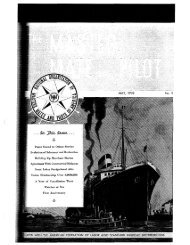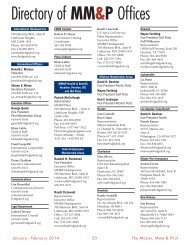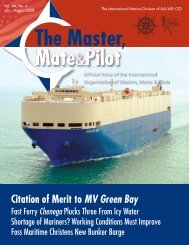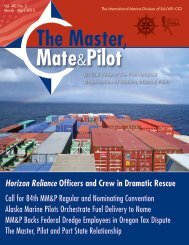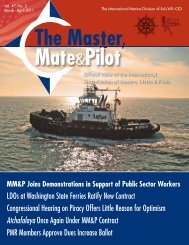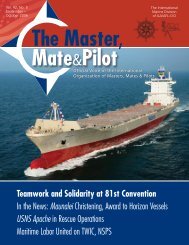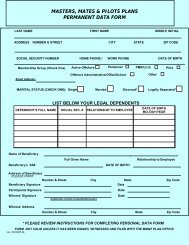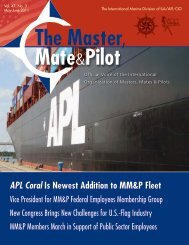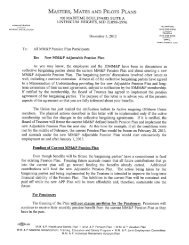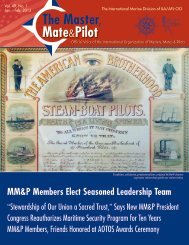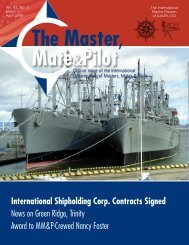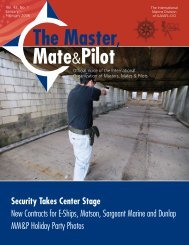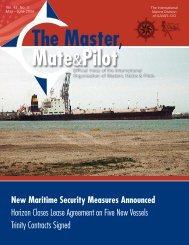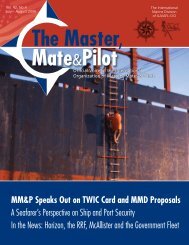May-June 2012 - The International Organization of Masters, Mates ...
May-June 2012 - The International Organization of Masters, Mates ...
May-June 2012 - The International Organization of Masters, Mates ...
Create successful ePaper yourself
Turn your PDF publications into a flip-book with our unique Google optimized e-Paper software.
New MM&P Jobs With APL<br />
news briefs<br />
MM&P is pleased to announce that there will be new jobs for MM&P members at American President Lines (APL). Over the course <strong>of</strong><br />
the next six months, this long-time MM&P employer will be replacing its four U.S.-flag C-10 Class vessels with four newer S-12 Class<br />
vessels as part <strong>of</strong> its Maritime Security Program<br />
(MSP) fleet.<br />
Two <strong>of</strong> the four S-12 Class vessels are currently<br />
under contract with the American Maritime<br />
Officers. <strong>The</strong>se vessels, the MV Cyprine and the<br />
MV Pearl, will join the MV Agate and the<br />
MV Coral under MM&P contract. <strong>The</strong> transfer <strong>of</strong><br />
MSP vessels and the resulting terms <strong>of</strong> employment<br />
are in accordance with the existing collective<br />
bargaining agreement between MM&P and<br />
APL.<br />
Although the C-10 Class ships—MV President<br />
Adams, MV President Jackson, MV President<br />
Polk and MV President Truman—will be leaving<br />
the MSP program, they are slated to remain<br />
in U.S.-flag operation under the terms <strong>of</strong> the<br />
MM&P-APL collective bargaining agreement for<br />
non-MSP vessels. <strong>The</strong>se developments will result<br />
in a net gain <strong>of</strong> two ships under contract and will<br />
safeguard the jobs <strong>of</strong> all MM&P members currently<br />
employed aboard the vessels.<br />
APL President Truman. Although the C-10 Class ships will be leaving the MSP program, they<br />
are slated to remain under U.S.-flag operation under the terms <strong>of</strong> the MM&P-APL collective<br />
bargaining agreement for non-MSP vessels.<br />
Puerto Rico Has Jones Act to Thank<br />
For 20,000 Maritime Jobs, MM&P Tells GAO<br />
Representatives <strong>of</strong> MM&P met in San Juan in April with <strong>of</strong>ficials<br />
<strong>of</strong> the U.S. Government Accountability Office (GAO), a research<br />
arm <strong>of</strong> the federal government. Participants in the meeting<br />
included MM&P Pilot Group member Capt. Roberto Candelario,<br />
MM&P Puerto Rico Representative Eduardo Iglesias and MM&P<br />
<strong>International</strong> Counsel Gab Terrasa.<br />
<strong>The</strong> meeting took place in the context <strong>of</strong> a study requested by<br />
a politician, Puerto Rico Resident Commissioner Pedro Pierluisi,<br />
who has asked the GAO to examine “the impact <strong>of</strong> the Jones Act<br />
on the economy <strong>of</strong> Puerto Rico.” <strong>The</strong> Jones Act is the body <strong>of</strong> law<br />
that requires that ships in America’s domestic trades be built in<br />
U.S. shipyards, crewed by U.S.-citizen mariners and operated by<br />
U.S. companies. Pierluisi says his goal is “to determine once and<br />
for all the impact the Jones Act has on our economy… [because]<br />
a broad array <strong>of</strong> economists in Puerto Rico have expressed concern<br />
that the Jones Act hinders the island’s economic growth…”<br />
First <strong>of</strong>f, the MM&P representatives told GAO that the<br />
Jones Act guarantees thousands <strong>of</strong> well-paying maritime jobs<br />
to residents <strong>of</strong> Puerto Rico. Candelario, who is president <strong>of</strong><br />
the San Juan Pilots Association, also underlined the fact that<br />
only American maritime workers are subject to Department <strong>of</strong><br />
Homeland Security background and security checks. He pointed<br />
out that exempting Puerto Rico from the Jones Act would give<br />
access to the island’s waterways and ports to foreign companies<br />
and foreign maritime workers not subject to U.S. background<br />
and security checks.<br />
Transportation costs <strong>of</strong> Jones Act ships do not have a significant<br />
influence on the final market price <strong>of</strong> goods in Puerto Rico,<br />
the three MM&P representatives told GAO. In the U.S. Virgin<br />
Islands, for example, market prices <strong>of</strong> U.S. manufactured goods<br />
are comparable to or higher than those in Puerto Rico. <strong>The</strong><br />
Virgin Islands, which are part <strong>of</strong> the United States and in close<br />
proximity to Puerto Rico, are outside the Jones Act and completely<br />
open to foreign-flag ships.<br />
Candelario, Iglesias and Terrasa told the GAO <strong>of</strong>ficials that<br />
higher market prices in Puerto Rico and the Virgin Islands<br />
compared to mainland U.S. prices are due to a lack <strong>of</strong> economy<br />
<strong>of</strong> scale in the distribution system and control <strong>of</strong> the distribution<br />
system by a limited number <strong>of</strong> suppliers.<br />
“We don’t believe the final market prices <strong>of</strong> goods going into<br />
or out <strong>of</strong> Puerto Rico would be significantly changed if U.S.<br />
ships were replaced by foreign-flagged ships,” Candelario said.<br />
“<strong>The</strong> major impact would be to shift wages, pr<strong>of</strong>its, taxes and<br />
the economic contributions <strong>of</strong> U.S. jobs into the hands <strong>of</strong> foreign<br />
interests—to the detriment <strong>of</strong> the U.S. economy and U.S. jobs.”<br />
<strong>The</strong> Master, Mate & Pilot - 1 - <strong>May</strong> - <strong>June</strong> <strong>2012</strong>



